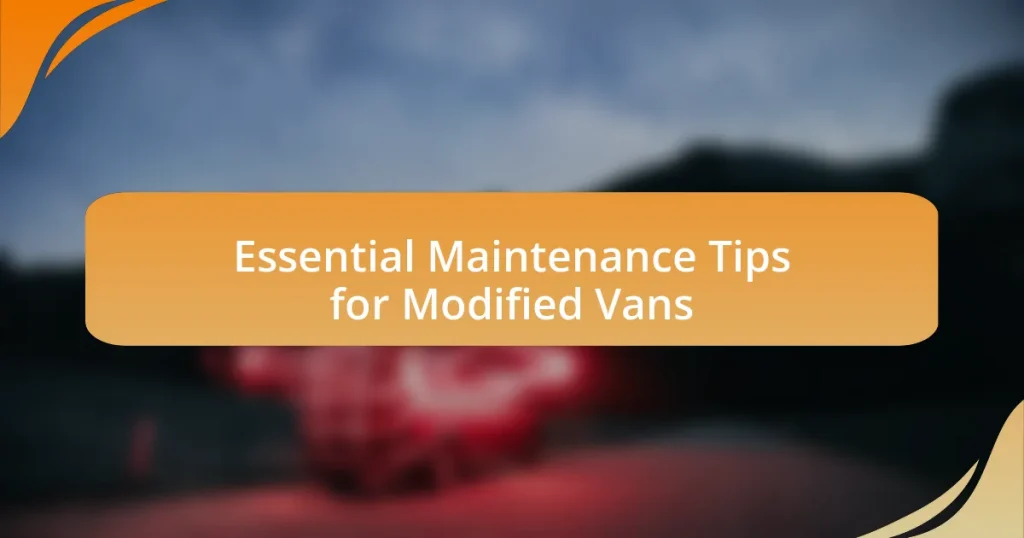The article focuses on essential maintenance tips for modified vans, emphasizing the importance of regular inspections, routine checks of the engine and transmission, and monitoring tire pressure and tread depth. It highlights the unique maintenance considerations required for specific modifications, such as suspension alterations and engine upgrades, and discusses the consequences of neglecting maintenance, including decreased performance and safety risks. Key areas of focus during maintenance include the engine, brakes, tires, electrical systems, and suspension, with practical advice on tools, resources, and best practices to enhance the longevity and reliability of modified vans.

What are Essential Maintenance Tips for Modified Vans?
Essential maintenance tips for modified vans include regular inspections of the vehicle’s modifications, routine checks of the engine and transmission, and consistent monitoring of tire pressure and tread depth. Regular inspections help identify any issues with modifications, ensuring safety and functionality. Routine checks of the engine and transmission can prevent costly repairs and maintain performance, as studies show that regular maintenance can extend vehicle lifespan by up to 50%. Monitoring tire pressure and tread depth is crucial for safety and fuel efficiency, as under-inflated tires can reduce fuel economy by 3% for every 1 PSI drop in pressure.
Why is regular maintenance important for modified vans?
Regular maintenance is crucial for modified vans to ensure safety, reliability, and optimal performance. Modified vans often have alterations that can affect their mechanical integrity, handling, and overall functionality. Regular checks can identify potential issues early, such as wear on modified suspension systems or stress on custom electrical components, which can prevent costly repairs and enhance the lifespan of the vehicle. Additionally, maintaining compliance with safety regulations is essential, as modifications may change how a vehicle is assessed for roadworthiness.
What specific modifications require unique maintenance considerations?
Specific modifications that require unique maintenance considerations include suspension alterations, engine modifications, and electrical system upgrades. Suspension alterations, such as lowering or raising a vehicle, can affect alignment and tire wear, necessitating regular checks to ensure optimal performance. Engine modifications, like turbocharging or supercharging, may require specialized oil changes and cooling system maintenance to prevent overheating and ensure efficiency. Electrical system upgrades, including aftermarket lighting or sound systems, can lead to increased battery drain and may require periodic inspections to ensure proper function and safety. These considerations are critical for maintaining the performance and safety of modified vans.
How can neglecting maintenance affect the performance of modified vans?
Neglecting maintenance can significantly degrade the performance of modified vans. Regular maintenance ensures that modifications, such as enhanced engines or suspension systems, function optimally; without it, issues like engine misfires, reduced fuel efficiency, and compromised handling can arise. For instance, a study by the Automotive Research Association found that vehicles with neglected maintenance can experience up to a 25% decrease in performance metrics, including acceleration and braking efficiency. This decline is often due to factors like worn-out components, fluid leaks, and improper tire pressure, which are exacerbated in modified vehicles that may already be operating beyond standard specifications.
What are the key areas to focus on during maintenance?
The key areas to focus on during maintenance of modified vans include the engine, brakes, tires, electrical systems, and suspension. Regularly checking the engine ensures optimal performance and fuel efficiency, while brake inspections are crucial for safety, as worn brakes can lead to accidents. Tire maintenance, including pressure checks and tread depth assessments, is essential for traction and handling. Electrical systems should be examined to prevent failures, especially in modified setups where additional components may be added. Lastly, suspension checks are important to maintain ride quality and vehicle stability, particularly in modified vans that may have altered weight distributions.
How should the engine be maintained in modified vans?
To maintain the engine in modified vans, regular oil changes and monitoring of fluid levels are essential. Modified vans often experience increased stress on the engine due to enhanced performance, making it crucial to change the oil every 3,000 to 5,000 miles or as recommended by the manufacturer. Additionally, checking coolant, transmission fluid, and brake fluid levels regularly helps prevent overheating and ensures optimal performance. Regular inspections of the air filter and fuel system are also important, as modifications can affect airflow and fuel delivery. Following these maintenance practices can enhance engine longevity and reliability in modified vans.
What tire maintenance practices are essential for modified vans?
Essential tire maintenance practices for modified vans include regular tire pressure checks, tread depth monitoring, and alignment inspections. Maintaining proper tire pressure is crucial, as under-inflated or over-inflated tires can lead to uneven wear and reduced handling performance. According to the National Highway Traffic Safety Administration, maintaining the recommended tire pressure can improve fuel efficiency by up to 3%.
Monitoring tread depth is also vital; tires should have a minimum tread depth of 2/32 of an inch to ensure adequate traction and safety. Additionally, alignment inspections help prevent uneven tire wear, which can occur more frequently in modified vans due to changes in weight distribution and suspension geometry. Regular rotation of tires every 5,000 to 7,500 miles can further extend tire life and enhance performance.
How can the electrical system be properly maintained?
To properly maintain the electrical system in modified vans, regular inspections and testing of all electrical components are essential. This includes checking the battery for corrosion, ensuring connections are tight, and testing the voltage output to confirm it meets specifications. Additionally, inspecting wiring for wear or damage and replacing any frayed or exposed wires prevents potential short circuits. According to the National Fire Protection Association, electrical failures are a leading cause of vehicle fires, highlighting the importance of routine maintenance to ensure safety and functionality.
What tools and resources are necessary for effective maintenance?
Effective maintenance of modified vans requires a set of essential tools and resources, including basic hand tools, diagnostic equipment, and maintenance supplies. Basic hand tools such as wrenches, screwdrivers, and pliers are necessary for routine repairs and adjustments. Diagnostic equipment, like OBD-II scanners, helps identify engine issues and monitor performance. Additionally, maintenance supplies such as oil, filters, and cleaning products are crucial for regular upkeep. These tools and resources ensure that modified vans operate efficiently and safely, reducing the risk of breakdowns and extending the vehicle’s lifespan.
What basic tools should every modified van owner have?
Every modified van owner should have a basic toolkit that includes a socket set, wrenches, screwdrivers, pliers, and a tire pressure gauge. These tools are essential for performing routine maintenance and repairs on modified vans, which often require adjustments and modifications to various systems. A socket set allows for easy access to bolts and nuts, while wrenches provide leverage for tightening or loosening components. Screwdrivers are necessary for securing panels and electrical connections, pliers assist in gripping and manipulating parts, and a tire pressure gauge ensures proper tire maintenance, which is crucial for safety and performance.
Where can owners find reliable maintenance guides and resources?
Owners can find reliable maintenance guides and resources through manufacturer websites, automotive forums, and specialized maintenance manuals. Manufacturer websites often provide official documentation and service guides tailored to specific models, ensuring accuracy and relevance. Automotive forums, such as those dedicated to modified vans, offer community-driven insights and shared experiences, which can be invaluable for practical maintenance tips. Additionally, specialized maintenance manuals, available for purchase or at libraries, provide detailed instructions and specifications for various maintenance tasks, ensuring owners have access to comprehensive and reliable information.
How can owners identify potential issues before they become serious?
Owners can identify potential issues before they become serious by conducting regular inspections and maintenance checks on their modified vans. Routine checks should include monitoring fluid levels, inspecting tires for wear, and examining the braking system for any signs of deterioration. According to the National Highway Traffic Safety Administration, regular vehicle maintenance can prevent up to 75% of mechanical failures. Additionally, utilizing diagnostic tools can help detect electronic system issues early, allowing for timely repairs.
What are the common warning signs of maintenance issues in modified vans?
Common warning signs of maintenance issues in modified vans include unusual noises, fluid leaks, warning lights on the dashboard, and changes in handling or performance. Unusual noises, such as grinding or squeaking, often indicate problems with the brakes or suspension. Fluid leaks, particularly oil or coolant, can signal engine or transmission issues. Warning lights, such as the check engine light, suggest that the vehicle’s onboard diagnostics have detected a fault. Changes in handling, like pulling to one side or difficulty steering, may indicate alignment or tire issues. Regular monitoring of these signs can prevent more severe problems and ensure the safety and reliability of modified vans.
How often should inspections be conducted to ensure safety?
Inspections should be conducted at least once a year to ensure safety for modified vans. Regular annual inspections help identify potential issues before they become serious problems, ensuring that all modifications comply with safety standards. According to the National Highway Traffic Safety Administration, routine inspections can significantly reduce the risk of accidents caused by mechanical failures, thereby enhancing overall vehicle safety.

What are the best practices for maintaining modified vans?
The best practices for maintaining modified vans include regular inspections, adherence to manufacturer specifications, and timely servicing of modifications. Regular inspections help identify wear and tear on both the vehicle and its modifications, ensuring safety and performance. Adhering to manufacturer specifications is crucial, as modifications can affect the vehicle’s warranty and functionality; for instance, using parts that meet OEM standards can prevent compatibility issues. Timely servicing of modifications, such as upgraded suspension or electrical systems, is essential to maintain optimal performance and safety. According to the National Highway Traffic Safety Administration, regular maintenance can significantly reduce the risk of breakdowns and accidents, reinforcing the importance of these practices.
How can routine checks improve the longevity of modified vans?
Routine checks can significantly enhance the longevity of modified vans by identifying and addressing potential issues before they escalate into major problems. Regular inspections of critical components such as the engine, brakes, and suspension systems ensure that any wear and tear is detected early, allowing for timely repairs. For instance, a study by the Automotive Maintenance and Repair Association indicates that vehicles maintained with routine checks can last up to 50% longer than those that are not regularly serviced. This proactive approach not only prevents costly repairs but also maintains the vehicle’s performance and safety, ultimately extending its lifespan.
What specific checks should be included in a routine maintenance schedule?
A routine maintenance schedule for modified vans should include checks on the engine oil, coolant levels, brake fluid, tire pressure and tread depth, battery condition, and all lights and signals. Regularly monitoring engine oil ensures proper lubrication and performance, while checking coolant levels prevents overheating. Brake fluid checks are crucial for safety, as low levels can affect braking efficiency. Maintaining correct tire pressure and tread depth enhances fuel efficiency and handling. Battery condition checks help avoid unexpected failures, and ensuring all lights and signals function properly is essential for safe driving. These checks are vital for the longevity and safety of modified vans.
How can owners create a personalized maintenance checklist?
Owners can create a personalized maintenance checklist by assessing their specific van modifications and usage patterns. This involves identifying key components that require regular attention, such as the engine, brakes, tires, and any custom features unique to the modified van. Owners should document maintenance tasks based on manufacturer recommendations and personal experiences, ensuring to include frequency and specific actions needed for each component. For example, if a van has a modified suspension system, the checklist should include regular inspections of that system to ensure safety and performance. By tailoring the checklist to their van’s unique features and usage, owners can effectively maintain their vehicle’s performance and longevity.
What role does professional servicing play in maintenance?
Professional servicing is crucial in maintenance as it ensures that modified vans operate safely and efficiently. Regular professional servicing identifies potential issues before they escalate, thereby prolonging the lifespan of the vehicle and enhancing performance. For instance, a study by the Automotive Service Association indicates that routine maintenance can reduce the likelihood of major repairs by up to 50%. This proactive approach not only saves costs in the long run but also ensures compliance with safety regulations, making professional servicing an essential component of effective maintenance for modified vans.
When should modified van owners seek professional help?
Modified van owners should seek professional help when they notice significant changes in performance, unusual noises, or warning lights on the dashboard. These indicators often signal underlying issues that require expert diagnosis and repair. For instance, if a modified van experiences a drop in fuel efficiency or handling, it may indicate problems with the suspension or engine modifications. Additionally, if any modifications have been made that affect safety features, such as brakes or steering, professional evaluation is crucial to ensure compliance with safety standards and regulations.
How can owners choose the right mechanic for modified vans?
Owners can choose the right mechanic for modified vans by seeking professionals with specific experience in van modifications and a solid understanding of aftermarket parts. Mechanics who specialize in modified vehicles often have certifications or training related to custom builds, which ensures they are familiar with the unique requirements and potential issues that can arise from modifications. Additionally, checking reviews and testimonials from other modified van owners can provide insights into the mechanic’s reliability and expertise. Engaging in direct conversations with potential mechanics about their experience with similar modifications can further validate their capability to handle specialized maintenance and repairs effectively.

What common mistakes should be avoided in modified van maintenance?
Common mistakes to avoid in modified van maintenance include neglecting regular inspections, overlooking the importance of proper weight distribution, and failing to maintain upgraded components. Regular inspections are crucial as they help identify potential issues before they escalate, ensuring safety and reliability. Proper weight distribution is essential because improper loading can affect handling and braking performance, leading to accidents. Additionally, upgraded components, such as suspension and brakes, require specific maintenance that differs from standard parts; neglecting this can result in premature wear or failure.
What are the pitfalls of DIY maintenance for modified vans?
The pitfalls of DIY maintenance for modified vans include the risk of improper repairs, which can lead to safety hazards and costly damage. Modified vans often have unique systems and components that require specialized knowledge; without this expertise, individuals may overlook critical issues or use incorrect parts. Additionally, DIY maintenance can void warranties if not performed according to manufacturer specifications, resulting in financial loss. Furthermore, inadequate tools or techniques can lead to subpar work, increasing the likelihood of breakdowns or accidents on the road.
How can improper modifications lead to maintenance challenges?
Improper modifications can lead to significant maintenance challenges by creating compatibility issues within the vehicle’s systems. For instance, alterations to the engine or suspension can disrupt the vehicle’s balance and performance, leading to increased wear on components. A study by the National Highway Traffic Safety Administration indicates that vehicles with non-standard modifications are 30% more likely to experience mechanical failures. These failures often result in costly repairs and extended downtime, complicating routine maintenance and potentially compromising safety.
What are the consequences of ignoring manufacturer recommendations?
Ignoring manufacturer recommendations can lead to significant consequences, including safety hazards, increased repair costs, and voided warranties. When vehicle owners neglect these guidelines, they risk compromising the vehicle’s performance and reliability, which can result in accidents or mechanical failures. For instance, failure to adhere to recommended maintenance schedules can lead to engine damage, as regular oil changes and inspections are crucial for optimal functioning. Additionally, many manufacturers specify certain parts and fluids that must be used; using alternatives can cause compatibility issues, further escalating repair expenses. Moreover, warranties often stipulate that adherence to manufacturer guidelines is necessary for coverage; thus, ignoring these recommendations can result in the loss of warranty protection, leaving the owner financially responsible for repairs that could have been covered.
What are the most effective troubleshooting tips for modified vans?
The most effective troubleshooting tips for modified vans include regularly checking electrical systems, inspecting the suspension and brakes, and monitoring engine performance. Regularly checking electrical systems ensures that modifications do not interfere with the van’s wiring, which can lead to failures; for instance, loose connections can cause lights or accessories to malfunction. Inspecting the suspension and brakes is crucial because modifications may alter weight distribution, affecting handling and stopping distance; ensuring these components are in good condition can prevent accidents. Monitoring engine performance helps identify issues early, such as unusual noises or decreased power, which can indicate problems with modifications like exhaust systems or air intakes. These tips are essential for maintaining safety and reliability in modified vans.
How can owners diagnose common issues on their own?
Owners can diagnose common issues on their own by performing regular visual inspections, listening for unusual sounds, and checking fluid levels. Regular visual inspections allow owners to identify leaks, worn belts, or damaged components, which are common indicators of mechanical problems. Listening for unusual sounds, such as grinding or knocking, can help pinpoint issues with the engine or transmission. Additionally, checking fluid levels, including oil, coolant, and brake fluid, ensures that the vehicle operates within safe parameters, as low levels can lead to significant damage. These methods are effective because they empower owners to recognize early signs of trouble, potentially preventing costly repairs.
What resources are available for troubleshooting specific problems?
Resources available for troubleshooting specific problems with modified vans include manufacturer manuals, online forums, and diagnostic tools. Manufacturer manuals provide detailed specifications and troubleshooting steps tailored to specific models, ensuring accurate guidance. Online forums, such as those dedicated to modified vans, offer community support where users share experiences and solutions to common issues. Diagnostic tools, like OBD-II scanners, allow users to identify error codes and assess vehicle performance, facilitating targeted troubleshooting. These resources collectively enhance the ability to effectively address and resolve specific problems encountered in modified vans.
What practical maintenance tips can enhance the performance of modified vans?
Regularly checking and maintaining the engine, transmission, and suspension systems can significantly enhance the performance of modified vans. Ensuring that the engine oil is changed at recommended intervals helps maintain optimal lubrication and reduces wear, while monitoring the transmission fluid levels ensures smooth shifting and prevents overheating. Additionally, inspecting and adjusting the suspension components, such as shocks and struts, can improve handling and ride quality, which is crucial for modified vans that may have altered weight distributions.
Furthermore, maintaining proper tire pressure and alignment is essential, as it affects fuel efficiency and overall driving stability. According to the National Highway Traffic Safety Administration, under-inflated tires can reduce fuel economy by up to 3%. Regularly cleaning and replacing air filters can also improve engine efficiency, as a clean filter allows for better airflow, enhancing combustion.
Lastly, keeping the electrical system in check, including battery health and wiring integrity, ensures that all modifications function correctly and reliably. These maintenance practices collectively contribute to the longevity and performance of modified vans.
How can regular cleaning contribute to better maintenance?
Regular cleaning significantly contributes to better maintenance by preventing the buildup of dirt, grime, and corrosion on modified vans. This proactive approach helps to preserve the vehicle’s exterior and interior surfaces, reducing wear and tear over time. For instance, regular washing can eliminate contaminants that may lead to rust, while interior cleaning can prevent fabric deterioration and maintain hygiene. Studies indicate that vehicles that undergo consistent cleaning and detailing can retain their value better, as cleanliness is a key factor in resale value.
What are the benefits of keeping detailed maintenance records?
Keeping detailed maintenance records enhances vehicle reliability and longevity. These records provide a comprehensive history of all maintenance activities, which helps identify patterns in vehicle performance and potential issues before they escalate. For example, studies show that regular maintenance can extend a vehicle’s lifespan by up to 50%, as documented by the Automotive Maintenance and Repair Association. Additionally, detailed records can improve resale value, as prospective buyers often seek evidence of proper care and maintenance history.



